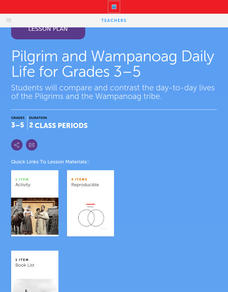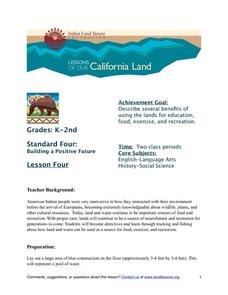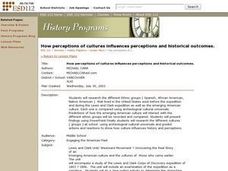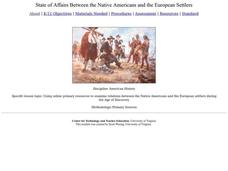Smithsonian Institution
Harvest Ceremony: Beyond the Thanksgiving Myth
There is a grain of truth in myths. Young historians investigate the truths surrounding the popular beliefs about the First Thanksgiving in Plymouth, Massachusetts. After reading the information in a study guide, they use what they...
Curated OER
Food Traditions: Making Cherokee Bean Bread
Imagine being forced out of your home and walking over 1,000 miles with only the things you could carry. How would you survive? What would you eat? After reading about the Trail of Tears and Cherokee resilience, middle schoolers are...
K20 LEARN
Transcending Boundaries - The Kiowa Six: The Legacy and Contributions of Six Kiowa Artists
The Kiowa Six, a group of Kiowa artists, are featured in the lesson that asks young historians to consider the importance of art in representing a culture and contributing to a group's legacy. After examining paintings by the group and...
Curated OER
Navajo Weaving: A Lesson in Math and Tradition
Combine geometry and tradition with a lesson that spotlights Navajo weaving. The book, The Goat in the Rug by Charles L. Blood and Martin Link hooks scholars before watching a video of Navajo people tending their sheep and beginning to...
Curated OER
Indigenous Peoples’ Day Lesson Plan
Indigenous Land Guardianship, Settler Colonialism, Racial Capitalism. While the terms may be new to some, they feature in a lesson plan designed for Indigenous Peoples' Day. Young scholars investigate four concepts: Land...
Scholastic
Pilgrim and Wampanoag Daily Life for Grades 3-5
Thirteen steps make up a lesson that challenges pupils to compare and contrast the daily lives of Pilgrims and the Wampanoag tribe. Learners revisit the Graffiti Wall then break into small groups for an investigative reading assignment...
K20 LEARN
The Conflict at the Washita River: The Indian Wars in Indian Territory
"Battle" or "Massacre"? Words matter, especially when labeling historical events. That's the big idea in a lesson about the 1868 conflict at the Washita River. After examining two images of the event, groups read and discuss articles...
Huntington Library
Everyday Life - Exploring the California Missions
Young scholars relive history as they examine primary sources that document everyday life in the California missions. During a class viewing of the included slideshow presentation, children analyze documents, paintings, and drawings in...
Indian Land Tenure Foundation
Gifts from Land and Water
With a series of fun hands-on simulations, young children can learn about conservation and natural resources. Your learners become land detectives, discussing and investigating the gifts that the land and water provide them. They then...
Indian Land Tenure Foundation
Sharing Resources: The Nuts Game
The land has always provided its inhabitants with resources that allow them to survive. However, sometimes resources run scarce and sharing becomes an important task. Help little ones understand why and how people have shared resources...
Memorial Hall Museum
Problems and Events Leading Up To the Attack of 1704
Groups read primary and secondary sources detailing the ambush at Bloody Brook on September 18, 1675 and the attack on The Falls in May of 1676. After examining the results of each attack, groups reflect on the language used in the...
Georgia Department of Education
Native Americans in Georgia History
Let your learners find out firsthand what hunting and gathering was really like, with a role-play activity they will remember for years. The class researches how indigenous people used plants and animals to survive while respecting and...
Curated OER
Forced to Move in More Ways Than One
Eleventh graders explore the Native American movement. They study the Indian Removal Act of 1830, the Dawes Act of 1887, and the Indian Boarding Schools in 1887. They research each episode and create a Venn diagram poster.
Curated OER
How Perceptions of Cultures Influences Perceptions and Historical Outcomes
Learners research different ethnic groups that lived in the United States. They compare and contrast Spanish, African American and Native American cultures and how American culture interacted with them. They present their findings...
Curated OER
The History of Maple Syrup
Students explore the process of harvesting maple syrup. In this science and history lesson, students make their own maple syrup and create a picture book that shows the Native American and American pioneer methods of making the syrup.
Curated OER
The Importance of Plants to Native Cultures in the Past and Present
Eighth graders investigate the founding and history of Sluice Boxes State Park. They use both primary and secondary resources to collect data. The focus is upon the use of native plants to make medicines. They write reports about several...
Curated OER
History Detectives
Fifth graders investigate the significant events in America's history. Students listen to a variety of books based on significant historical events in America. Students divide into 6 groups, each of which is responsible for researching...
Curated OER
State of Affairs Between the Native Americans and the European Settlers
Students examine relationship and contact between Native Americans and European Settlers, using primary sources.
Curated OER
Debating for Land
Learners discover about the varying attitudes and definitions of land ownership held by Native and European Americans. They study a variety of primary documents from the nineteenth century.
Curated OER
The Brief American Pageant: The Rise of a Mass Democracy
Focusing on the 1828 election of Andrew Jackson, the removal of Southern Native American tribes (Trail of Tears), and the Texas Revolution, these three slides are full of good information for your lecture. Though brief, the maps featured...
Race Briges Studio
I am Indopino: Or, How to Answer the Question, "Who Are You?"
In our increasingly multi-ethnic society, many learners find it difficult to identify themselves as belonging to any one ethnicity. Gene Tagaban, a Tlingit, Cherokee, Filipino offers his personal experiences with these questions in his...
K12 Reader
Eastern Woodland Natives
Supplement your social studies instruction with a reading passage about the Eastern Woodlands. After reading the passage, learners respond to five related questions.
Teaching Tolerance
Thanksgiving Mourning
Two primary sources, a speech, and an article provide tweens and teens with different perspectives of the American Thanksgiving holiday. After analyzing Wamsutta James' suppressed speech and Jacqueline Keeler's article, class members use...
National Museum of the American Indian
The Kwakwaka'Wakw: A Study of a North Pacific Coast People and the Potlatch
Discover the cultural practices and unique value systems of a group of native peoples from Canada called the Kwakwaka'wakw. Your young historians will discuss how conceptions of wealth can vary and how these native people utilized...

























